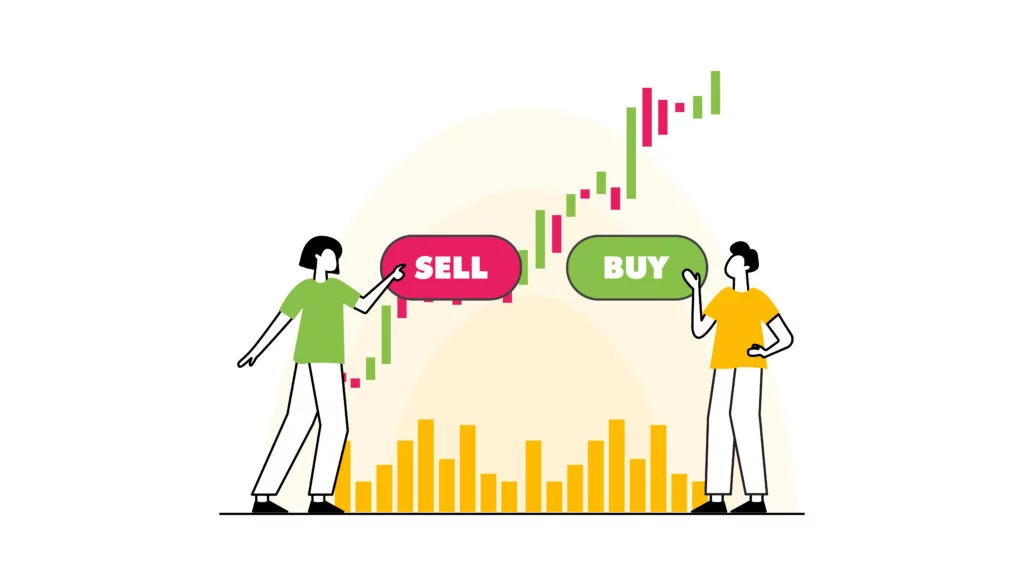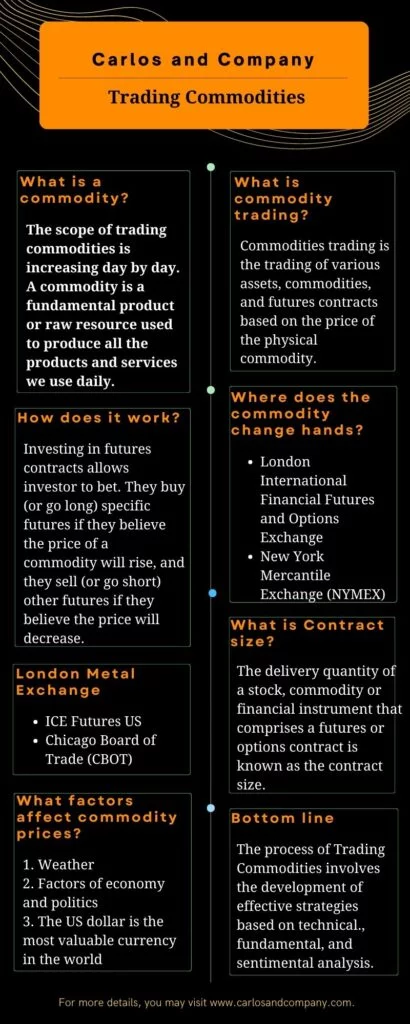Major Exchange Platform for Trading Commodities
The scope of trading commodities is increasing day by day. Many traders, daily, invest in commodities to make money. However, to increase the chances of your success, knowledge of the commodity market is a must.
A commodity is an essential product we use in businesses and change for similar products. Trading in commodities is an essential component of the financial market. It is because Commodities are necessary for producers and manufacturers.
A commodity is a fundamental product or raw resource used to produce all the products and services we use daily.
Here's a quick look at what you'll read
A commodity is a fundamental product or raw resource used to produce all the products and services we use daily.
Commodities trading is the trading of various assets, commodities, and futures contracts based on the price of the physical commodity.
Investing in futures contracts allows investors to bet. They buy (or go long) specific futures if they believe the price of a commodity will rise, and they sell (or go short) other futures if they believe the price will decrease.
- London International Financial Futures and Options Exchange
- New York Mercantile Exchange (NYMEX)
- ICE Futures US
- Chicago Board of Trade (CBOT)
The delivery quantity of a stock, commodity or financial instrument that comprises a futures or options contract is known as the contract size.
1. Weather
2. Factors of economy and politics
3. The US dollar is the most valuable currency in the world
What is commodity trading, and how does it work?
Commodities trading is the trading of various assets, commodities, and futures contracts based on the price of the physical commodity.
Investing in futures contracts allows investors to bet on the predicted future value of a particular commodity.
They buy (or go long) specific futures if they believe the price of a commodity will rise, and they sell (or go short) other futures if they believe the price will decrease.

In recent years, the commodities market has changed dramatically. Not only does it trade a wide range of commodities, but it is also a worldwide market with global exchanges. During the week, you can trade commodities almost 24 hours a day.
Where does the commodity change hands?
If you are thinking of how to start commodity trading, there are many Commodities trading platforms on which you can buy and trade commodities on various exchanges specializing in a particular commodity.
London International Financial Futures and Options Exchange
Sir Brian Williamson founded LIFFE in 1982 to capitalize on the possibilities created by the United Kingdom’s new currency law.
The London International Financial Futures and Options Market (LIFFE) was the old name of the major futures and options exchange in London, England. It was renamed ICE Futures Europe after a series of mergers and acquisitions (M&A) under control (ICE) of the Intercontinental Exchange.
New York Mercantile Exchange (NYMEX)
A group of dairy merchants had created the butter and cheese exchange of NEW York, the forerunner of NYMEX. NYMEX and COMEX joined in 1994 to form the world’s largest physical commodity exchange.
The world’s biggest physical commodities futures market, the New York Mercantile Exchange (NYMEX), is located in New York City. Now, The Chicago Mercantile Exchange Group (CME Group) owns it.
Chicago Mercantile Exchange (CME), Chicago Board of Trade (CBOT), New York Mercantile Exchange (NYMEX), and Commodity Exchange are the Inc. CME Group (COMEX). Across the major asset classes, each exchange lists various futures products, commodities and worldwide benchmarks.
London Metal Exchange
The London Metal Exchange (LME) is based in London, England, although since 2012, it has been operated by Hong Kong Exchange and Clearing. The London Metal Market (LME) trades comex products as futures and options exchange.
It is the world’s largest trading commodities platform for base metal options and futures contracts, including aluminium, zinc, lead, copper and nickel. Traders can also trade precious metals like gold and silver on the market.
ICE Futures US
Intercontinental Exchange (ICE) is a firm based in the United States that owns and runs financial and commodity exchanges. Futures exchange, cash exchange, central clearinghouse and market services for off-exchange trade are also part of ICE’s activities.

In the United States, Europe and Singapore, ICE operates futures markets. Its cash exchanges are the New York Stock Exchange (NYSE), NYSE ARCA, NYSE National, NYSE AMEX Options, NYSE ARCA Options, and NYSE Chicago. ICE Clear the US, ICE Clear Europe, ICE Clear Singapore, ICE Clear Credit, ICE Clear Netherlands, and ICE NGX are ICE’s six primary clearinghouses.
Chicago Board of Trade (CBOT)
The Chicago Board of Trade was established in the mid-nineteenth century in 1848 as a commodity exchange to assist farmers and commodity customers in managing risk by eliminating pricing uncertainty from agricultural commodities such as wheat and corn.
It now offers options and futures contracts on other items, including trading gold, silver, US Treasury bonds and energy.
Contract size
The delivery quantity of a stock, commodity or financial instrument that comprises a futures or options contract is known as the contract size. It is a standardized number that tells traders how much is bought or sold based on the contract’s parameters.
Exchanges often standardize contract sizes, which vary depending on the commodity, foreign currency or instrument. The underlying commodity or instrument also determines the dollar value of a unit change or a tick size.
Contract size refers to the amount of the underlying asset a derivative contract represents. One of the essential features of a futures contract is the expiration date. It helps determine which players are eligible to participate in the market.
As a result, large contract sizes usually indicate that large institutional investors are involved. Short contracts make them more accessible to all types of investors.
Examples of Contract Size
Commodities and other assets, such as currencies and interest rate futures, have many contract sizes.
For Example,
One Canadian dollar futures contract is worth $100,000.
The 5,000-bushel soybean contract is traded on the Chicago Board of Trade.
On COMEX, one gold futures contract is 100 ounces, 567.
In the gold contract example, a $1 change in the price of gold translates to a $100 change in the value of a gold futures contract.
Is trading commodities profitable
Trading commodities is one of the best ways to make a profit in modern times. However, a trader needs to understand that it also involves risk. The prices of commodities can be affected by different factors.
Therefore market knowledge is a must. Additionally, commodity trading requires a certain level of market knowledge and experience. Gold, crude oil, and aluminium are among the best commodities to trade for beginners.
What factors affect commodity prices?
Supply and demand strongly influence the way commodities are priced in the market. When supply is low, demand is strong, resulting in higher prices. When the situation reverses – when supply is high and demand is low – prices fall.
Trading commodities for beginners is a complex process. There are many variables which affect the prices.
Weather
The weather significantly impacts price variation for crop-related or agricultural commodities, especially in the near term.
The weather directly affects the price of a commodity when it affects the supply at a given location.
Corn, soybeans and wheat are commodities that fall under this group. Soft commodities include things like cotton, coffee and rice also.
Factors of economy and politics
War, political upheaval and other fundamental analysis factors can have a significant impact on pricing. For example, turbulence in the Middle East often causes oil prices to fluctuate due to supply-side uncertainty.
The US dollar is the most valuable currency in the world
Because commodities are frequently purchased in US dollars, their prices vary differently. When the dollar value falls, purchasing the same amount of commodities requires more dollars, resulting in higher commodity prices. On the other hand, if the dollar rises, the goods become more affordable, all else being equal.
Bottom line
The process of Trading Stock Indices, Forex and Commodities involves the development of effective strategies based on technical., fundamental, and sentimental analysis.
The commodities market is affected by several factors, such as economic indicators, politics, natural calamities, etc. So research and analysis of the commodity market are important to increase the chances of your profit.
